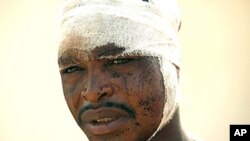Human Rights Watch says at least 800 people were killed in last month's electoral violence in Nigeria.
Three days of rioting began when supporters of opposition candidate Muhammadu Buhari burned electoral commission offices and police stations following results that showed President Goodluck Jonathan winning the vote last month.
Human Rights Watch Nigeria researcher Eric Guttschuss says the violence then turned sectarian as northern; predominantly Muslim Buhari supporters began attacking southern, mostly Christian Jonathan supporters.
“Individuals from the south who were seen as supporting the incumbent president Goodluck Jonathan were also attacked and houses and shops burned,” Guttschuss said.
Kaduna state was the most violent. Guttschuss says Human Rights Watch believes at least 180 people were killed in the northern cities of Kaduna and Zaria. Christians in southern parts of Kaduna state responded with their own attacks. “Members of Christian ethnic groups retaliated by also attacking Muslims and Hausa-Fulani, who are predominantly Muslim. From Christian and Muslim leaders who Human Rights Watch interviewed, as well as witnesses, more than 500 people were killed in southern Kaduna state. The majority of the victims in these areas were Muslim,” he said.
In both northern and southern Kaduna state, civilians at risk found shelter in army barracks and police stations. But Guttschuss says those security forces also took part in human-rights abuses during the unrest.
“In responding to the violence, both the soldiers and the police were implicated in excessive use of force, including the extra-judicial killings of unarmed residents, and in some areas the systematic beating of people who were arrested during or following the violence,” stated Guttschuss.
President Jonathan has appointed a 22-member panel to determine what caused the electoral violence and how such unrest might be prevented in the future.
Guttschuss says Nigerians are rightly skeptical about the panel's impact, given how many previous commissions of inquiry have been ignored.
As for preventing such violence in the future, Guttschuss says Human Rights Watch has traced past incidents of communal violence to state- and local-government policies that discriminate against non-indigenous residents and exacerbate existing communal tensions. “State and local-government policies have effectively relegated millions of Nigerians to the status of second-class citizens in the states in which they reside,” he said.
While last month's nationwide elections were among the fairest in Nigeria's history, Human Rights Watch says they were also among the most violent. The group says newly elected authorities should build on democratic gains by bringing to justice those who organized that violence.
Human Rights Watch: 800 Nigerians Killed in Electoral Violence
